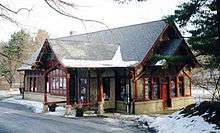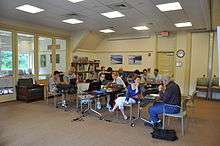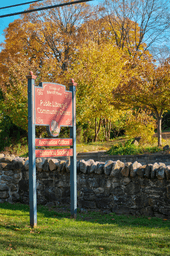Briarcliff Manor Public Library
.tif.jpg) Front entrance to the Briarcliff Manor Public Library facing Library Road | |
| Established | 1914[1](p61) |
|---|---|
| Location | Briarcliff Manor, New York |
| Coordinates | 41°08′48″N 73°49′28″W / 41.1466°N 73.8244°WCoordinates: 41°08′48″N 73°49′28″W / 41.1466°N 73.8244°W |
| Collection | |
| Size | 30,700[2] |
| Access and use | |
| Circulation | 101,599[2] |
| Population served | 7,696[2] |
| Other information | |
| Director | Melinda Greenblatt[2] |
| Staff | 2 3⁄4 full-time; 8 part-time[3] |
| Website | http://briarcliffmanorlibrary.org |
The Briarcliff Manor Public Library is the public library serving Briarcliff Manor, New York. It is located on the eastern edge of the Walter W. Law Memorial Park, on Library Road. The library is a member of Westchester Library System.[2][3] It is staffed by a director, 2 3⁄4 full-time and eight part-time employees, including reference and youth librarians. It is governed by a seven-member board, with a liaison to the village board. Services include computer classes, book-discussion groups, young-adult programs, a children's room and a local-history collection. Library spending constitutes about four percent of the village budget.[3] The library also houses the village's historical society and recreation department offices.
The library was founded in 1914 in the Briarcliff Community Club building. From the building's destruction in 1929 and over the next thirty years, the library was without a permanent location. In 1959, the library purchased the former Briarcliff Manor station of the New York and Putnam Railroad. After renovations in the late 1990s, a significant expansion was funded and completed in the late 2000s.
The Westchester County Bike Trail (also known as the North County Trailway), a 22.1-mile-long (35.6 km) rail trail, runs alongside the library, where it extends north to Baldwin Place in Somers, and south along NY Route 9A to Eastview in Mount Pleasant.[3][4]
History

The Briarcliff Manor Free Library was founded by Edward S. Arnold in 1914 at the Briarcliff Community Club. The building, built as a public school in 1898 at the current Pleasantville Road southbound ramp to Route 9A, was sold to the Westchester Parkway Commission in 1928 and burned down in 1929.[1](p61) World War I delayed the progress of the library; in 1921 it was revived, largely due to the efforts of Mrs. Alfred G. Bookwalter; at the time, the Library Board consisted entirely of women. On September 22, 1921, the library was registered with the New York State library system,[1](p61) and on March 8–13 of that year, the Briarcliff Free Library was officially opened.[5]
On September 1, 1922, the Club’s library funds were transferred to the Library Committee, and the village government donated $500 ($7,100 today)[6] to the library in 1924. At that time, it had 1,900 volumes; it grew to 3,000 in 1926 and to around 6,000 in 1939. In 1952, the library had 8,000 volumes, 1,000 of which were in storage due to a lack of shelf space.[1](p62) In 1988, the library's collections had grown to 25,000.[7](p151) In its early years, the library received many donations from the village Sunday school and the Community Club; a book-party was held on March 19, 1926 for the purpose of seeking book donations; 2,100 were donated, and 600 were retained after duplicates were sold. During that event, Briarcliff College trustee Barrett Clark displayed his collection of autographs and rare books.[5] In July 1928, the library was moved to the tower room of the Briarcliff Farms building, the present branch of the International Union of Operating Engineers. On March 18, 1930, after invitation from the Briarcliff Board of Education, the library was relocated again. It moved to a large room on the main floor of Briarcliff’s high school extension to its Law Park grade school building.[5] In 1949, the school required use of the room; the village board then provided two rooms in its recreation building on NY Route 100. On March 18, 1952, the New York State Board of Regents granted the library a provisional charter; that year its registration numbered 503.[1](p62) Also in 1952, the village semicentennial history book notes the need for a permanent home for the library.[1](p88)
Around 1939, the library received recently an efficiency rating of 92.84 percent from the Library Division of the New York State Education Department.[5] In 1944, the library received its highest efficiency rating, 98.3%, from the Library Extension Division of the University of the State of New York.[1](p62) The 1952 appropriation for the library was $1,800 ($16,000 today)[6]; its expenditures for 1951 were $1875.86.[1](p61)

On January 20, 1959, the library finally moved to its current location, the former Briarcliff Manor station on the New York City & Northern Railroad (later the New York and Putnam Railroad).[8] The station was built in 1906 by village founder Walter W. Law, as a replacement for a smaller station, moved to nearby Millwood.[7](pp39, 76) The railroad's Putnam Division was discontinued in 1958,[9] freeing up use of the building for the library. The library spent $12,500 ($101,500 today)[6] to purchase the building and an additional $6,500 ($52,800 today)[6] for renovations; it raised $14,000 ($113,600 today)[6] for the expenses from village residents; the rest was funded by the Library Board. In 1959, the library received its absolute charter, and received a charter in 1964 to become a public library; the Briarcliff Manor Public Library.[10] In the late 1900s, videocassettes were increasing in popularity; The New York Times reported in 1990 that the library had experienced a significant increase in their circulation, with over 5,435 circulated in that year, compared to 2,864 in 1989.[11]
The library, which had 3,200 square feet (300 m2), had no wireless capacity and poor shelving and lighting,[12] among other problems. A mezzanine was added in 1980 for more accessible shelf space. In 1995 a referendum was voted on for a new library of 10,600 square feet (980 m2); the referendum failed by 13 votes (871 were cast). From 1997 to 1999, major renovations took place both on the building's interior and exterior. In the early 2000s, plans began for an expansion to the library. A modular building was set up in 2004 as the library's children's room. In 2006, a $4 million bond resolution ($4.7 million today)[6] was passed for a two-story, 6,600-square-foot (610 m2) addition, which began construction in summer 2007 and opened February 19, 2009.[3][10] The part of the building that formerly housed the library is planned to be renovated and to become the Briarcliff Manor Community Center.[13] The community center has been in development since as late as 2013,[13] and has an estimated completion date of 2016 and cost of $1,800,000.[14]
Operations
As of 2014, the Briarcliff Manor Public Library is open seven days per week, except in August when it is closed each Sunday.[15] The library hosts four computer workstations and eight laptops, and has its own Wi-Fi network.[16] The building is home to a publicly reservable meeting room, and has a large parking lot accessible from Library Road.[3](p70) The Friends of the Briarcliff Manor Public Library is an organization through which community members may support the library.[17]
Directors
The first librarian was Louise Miller, from 1921 to 1926, acting while studying library service at Columbia University. Elizabeth Kelly was the next librarian, from 1926 to 1927, a part-time art teacher at Briarcliff High School. Grace Baird Hersey, mother of Pulitzer Prize-winning writer and journalist John Hersey, was the village librarian from 1928 to 1956.[1](pp61–2)[5][7](pp137, 234) After her was Mrs. William Osborne from 1956 to 1963, Mrs. Robert Widenhorn in 1963, Helen Barolini from 1964 to 1965, Mrs. Bryden M. Dow in 1965, Bettie Diver from 1965 to 1968, and Charles Farkas from 1968 to the 1990s.[7](p234) The current director is Melinda Greenblatt.[2]
Organizations

Briarcliff Manor-Scarborough Historical Society
In March 1974, after the village mayor appointed twelve people for a 75th anniversary committee, the committee began by forming the Briarcliff Manor-Scarborough Historical Society (BMSHS). The historical society published an updated village history (A Village Between Two Rivers: Briarcliff Manor) in 1977, marking the 75th anniversary of the village. The organization has since published several books, including a comprehensive history of the village. The publication, The Changing Landscape, a History of Briarcliff Manor-Scarborough, was written by Mary Cheever, wife of novelist John Cheever.[18] The historical society was initially located at the since-demolished Briarcliff Middle School building; it later moved to the second floor of a realty building on Pleasantville Road, and moved back to the school building after it was leased by Pace University.[7](p195) On March 21, 2010, the BMSHS was given a permanent location at the Eileen O'Connor Weber Historical Center, established as part of the library's expansion finished in 2009.[18] The current president, Karen Smith, heads a board of trustees, members of which have three-year terms with a required year recess between terms.[19]
Members of the historical society joined the nine-member Centennial Committee in 2002 to organize events for Briarcliff Manor's centennial.[20] The Centennial Committee and BMSHS helped organize several events for the village's 2002 centennial celebration, including the Centennial Variety Show at the Briarcliff High School auditorium in a sold-out two-night run on April 26–27, 2002.[21] The two-act show consisted of interpretations of village life by village organizations and a revue of Briarcliff Manor history in skits and songs.[20] Other society-sponsored events have included tours of homes and churches, bus tours, Hudson River cruises on historic boats such as the M/V Commander (built in 1917 and listed on the national and state registers of historic places), dances, antique-car exhibits, day trips to historic points of interest, art exhibits and events with authors and elected officials.[18]
Briarcliff Manor Recreation Department
The library houses the village recreation department, which has four staff and a six-member advisory committee, and provides recreation programming for the village.[22]
See also
References
- 1 2 3 4 5 6 7 8 9 Our Village: Briarcliff Manor, N.Y. 1902 to 1952. Historical Committee of the Semi–Centennial. 1952. OCLC 24569093.
- 1 2 3 4 5 6 "Briarcliff Manor Public Library". Libraries.org. Retrieved November 12, 2014.
- 1 2 3 4 5 6 "Comprehensive Plan – Village of Briarcliff Manor" (PDF). Village of Briarcliff Manor. November 2007. Retrieved September 12, 2014.
- ↑ "North Country Trailway" (PDF). Westchester County Department of Parks, Recreation & Conservation. 2009. Retrieved September 12, 2014.
- 1 2 3 4 5 Pattison, Robert (1939). A History of Briarcliff Manor. William Rayburn. OCLC 39333547.
- 1 2 3 4 5 6 Consumer Price Index (estimate) 1800–. Federal Reserve Bank of Minneapolis. Retrieved November 10, 2015.
- 1 2 3 4 5 Cheever, Mary (1990). The Changing Landscape: A History of Briarcliff Manor-Scarborough. West Kennebunk, Maine: Phoenix Publishing. ISBN 0-914659-49-9. LCCN 90045613. OCLC 22274920. OL 1884671M.
- ↑ Yasinsac, Robert (2004). Images of America: Briarcliff Lodge. Charleston, South Carolina: Arcadia Publishing. ISBN 978-0-7385-3620-0. LCCN 2004104493. OCLC 57480785. OL 3314243M.
- ↑ Folsom, Merrill (May 30, 1958). "The Wheels of 'Old Put' Click Out a Sad Accompaniment to Riders' 'Auld Lang Syne'". The New York Times. Retrieved September 12, 2014.
- 1 2 "About the Library – Library History". Briarcliff Manor Public Library. Retrieved September 12, 2014.
- ↑ Buckvar, Felice (December 16, 1990). "Libraries Say Call For Videos Is Growing". The New York Times. Retrieved November 24, 2014.
- ↑ Brenner, Elsa (June 5, 2005). "Communities; Library Gets a Choice: Grow or Shut Down". The New York Times. Retrieved September 12, 2014.
- 1 2 Moorhead-Lins, Parry (July 27, 2013). "The New Briarcliff Manor Community Center". River Journal. Retrieved February 9, 2015.
- ↑ Bennett, Kate (October 16, 2015). "Coming to a Village Near You… Briarcliff's Projects Looking Good". River Journal. Retrieved October 25, 2015.
- ↑ Kaplan, Amy B.G. "Library Hours". Briarcliff Manor Public Library. Retrieved February 9, 2015.
- ↑ Mahoney, Geraldine. "Library Expansion Information". Briarcliff Manor Public Library. Retrieved February 9, 2015.
- ↑ "Our Mission". Friends of Briarcliff Manor Public Library, Inc. Retrieved February 9, 2015.
- 1 2 3 "Our History: a look back through four decades". Briarcliff Manor-Scarborough Historical Society. Retrieved September 12, 2014.
- ↑ "Briarcliff-Scarborough Historical Society". The Gazette. March 26, 2015. p. 7. Retrieved May 2, 2015.
- 1 2 Briarcliff Manor: The First 100 Years – The Centennial Variety Show. Village of Briarcliff Manor. 2002.
- ↑ Briarcliff Manor Centennial Committee (2002). The Briarcliff Manor Family Album: Celebrating a Century. Cornwall, New York: Village of Briarcliff Manor.
- ↑ Stefko, Joseph; Town and Village of Ossining, New York (April 2012). "Municipal Services & Financial Overview: Town and Village of Ossining, NY" (PDF). Center for Governmental Research. Retrieved September 12, 2014.
External links
| Wikimedia Commons has media related to Briarcliff Manor Public Library. |
- Briarcliff Manor Public Library
- Briarcliff Manor-Scarborough Historical Society
- Briarcliff Manor Recreation Department
- Friends of the Briarcliff Manor Public Library
- Building elevations
| Former services | ||||
| Preceding station | New York Central Railroad | Following station | ||
|---|---|---|---|---|
toward Brewster | Putnam Division | Graham toward Sedgwick Avenue |
||